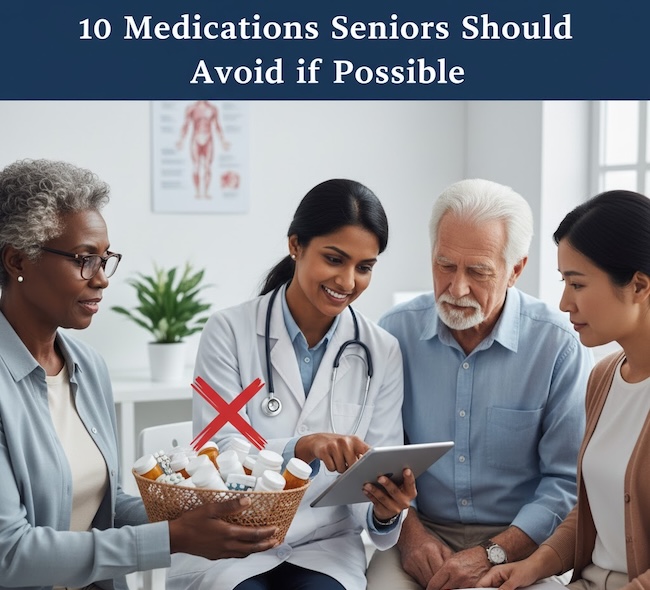When cold or flu symptoms strike, finding the proper medication for seniors requires extra caution. Older adults often have unique health considerations, like existing medical conditions or medication interactions, that make many over-the-counter cold remedies potentially risky.
Choosing the wrong product could lead to unnecessary side effects or complications. In this article, we’ll help you navigate the safest options for cold relief, offering expert-backed advice on which ingredients to look for or avoid!

If an older adult gets a cold or flu, your first instinct is to relieve their symptoms. But choosing over-the-counter cough and cold medicine can be confusing and potentially harmful if not done carefully. Hedva Barenholtz Levy, PharmD shares five tips to help caregivers choose safe cold medicine for seniors.
How Do We Find Safe Cold Medicines for Seniors?
When caring for an older adult with cold or flu symptoms, our first instinct is to help relieve their symptoms.
Hundreds of remedies for cough and cold symptoms are available on retail shelves.1 And nearly half of older adults use over-the-counter (OTC) products regularly, often taking them alongside prescribed medications.2,3
But choosing among OTC cough and cold products can be overwhelming and potentially harmful if not done carefully.
Side effects and interactions are an essential concern, especially because older adults typically have several health conditions and take multiple daily medications.
These five tips for choosing safe cold medicine for seniors will guide you through the maze and, more importantly, help older adults and family caregivers make safer choices when using OTC cough and cold medication.
5 Tips for Choosing Safe Cold Medicine for Seniors
1. Take Only Ingredients That Are Needed
Single-ingredient products are safest because they avoid unnecessary exposure or ingestion of excess amounts of medicine.
There are four types of medicines found in OTC cough and cold products:
- Antihistamines to treat a runny nose and sneezing
- Oral and nasal decongestants to treat a stuffy nose
- Cough medicines are used to either loosen a cough or suppress it
- Pain and fever reducers (usually acetaminophen)
Drug companies create hundreds of unique products by mixing and matching these ingredients in different combinations.
As a result, people often end up buying products that contain unnecessary medicines for symptoms they do not have.
More importantly, exposing the body to additional medications – even nonprescription ones – can increase the risk of side effects and interactions.
In addition, because people often buy more than one OTC product to relieve different symptoms, there is an increased risk of taking too much of a single ingredient when it is present in multiple products.
A notable concern is the risk of ingesting too much acetaminophen (a pain and fever reducer) that is commonly included in many OTC products. Too much acetaminophen increases the risk of liver damage.
2. Check for Interactions with Prescription and Nonprescription Medications
Interaction information must be included on the product label for all over-the-counter (OTC) products.
Please do not gloss over it; this is essential information.
For example, antihistamines interact with alcohol, medicines that cause sedation, and certain antidepressant medications.
Decongestants interact with certain antidepressants and can worsen conditions like high blood pressure, hyperthyroidism, diabetes, heart disease, glaucoma, and an enlarged prostate.
With the wide variety of OTC products on the market, the potential for a drug or health-condition interaction is high.
Before making a purchase, it’s well worth the time to double-check with the pharmacist to prevent a serious interaction.
3. Take the Proper Dosage
Dosing information must be provided on the product label. The amount of medication that equals one dose will be stated, along with the maximum amount that should be taken in 24 hours.
OTC labels now have a standardized format, making it easier for consumers to locate key information.
Remember to add up the amounts of a medicine across multiple products when calculating the amount taken in 24 hours.
4. Beware that Many Ingredients are of Questionable Benefit
Several ingredients are ineffective or of uncertain benefit4,5:
- Phenylephrine, an oral decongestant
- Antihistamines, when used alone to treat cold symptoms
- Cough medicines to thin the mucus (guaifenesin) or to suppress a cough (dextromethorphan)
Dextromethorphan is associated with drug interactions and side effects at high doses.
For nasal congestion, effective options include oral pseudoephedrine (be aware of side effects and interactions), nasal decongestant sprays used for no more than three days, and non-medical options such as saline nasal spray and Breathe Right strips.
For managing cough and cold symptoms, non-drug treatments like fluids, rest, a balanced diet, hot tea with honey, and chicken soup are preferred.
5. Seek Immediate Medical Attention When Needed
Symptoms should improve within seven days. If symptoms persist or worsen, see a healthcare provider right away.
Do not self-treat what appears to be a simple cold or the flu if your symptoms are not improving.
Recommended for you:
- Prevent Dangerous Drug Interactions in Seniors with a Drug Interaction Checker
- The Beers List: Medications Seniors Should Use with Caution
- Medications That Worsen Dementia and Increase Dementia Risk: Anticholinergics
Guest contributor: Hedva Barenholtz Levy, PharmD, BCPS, BCGP, is Director at HbL PharmaConsulting and a clinical pharmacist who specializes in working with older adults residing in the community setting. She promotes the safe and effective use of medications through comprehensive medication reviews and by educating patients, healthcare professionals, and others who work with older adults.
References:
- McCoul ED. Assessment of pharmacologic ingredients in common over-the-counter sinonasal medications. JAMA Otolaryngol Head Neck Surg 2020;146:810-15.
- Qato DM, Alexander GC, Conti RM, et al. Use of prescription and over-the-counter medications and dietary supplements among older adults. J Am Med Assoc 2008;300:2867-78.
- Kinsey JD, Nykamp D. Dangers of nonprescription medicines: educating and counseling older adults. Consult Pharm 2017;32:269-80.
- Hatton RC, Hendeles L. Over-the-counter oral phenylephrine: a placebo for nasal congestion. J Allergy Clin Immunol Pract 2015;3:709-10.
- Weinberger M, Hendeles L. Nonprescription medications for respiratory symptoms: facts and marketing fictions. Allergy Asthma Proc 2018













